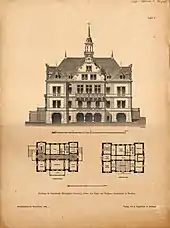Paul Weidner
Paul Weidner (11 February 1843[1] or 11 April 1843[2][3] – 30 April 1899[1] complete name Bernhard Paul Weidner[4]) was a German architect.
Paul Weidner | |
|---|---|
| Born | Paul Weidner 11 February 1843 Dresden, Saxony |
| Died | 30 April 1899 (aged 56) Dresden, German Empire |
| Education | Dresden Academy of Fine Arts. |
| Occupation | Architect |
| Years active | 2004–present |
| Awards | Small Golden Medal of the Academy of Arts Architectural design competition |
| Scientific career | |
| Institutions | Giese & Weidner |
Life and career
.jpg.webp)

Born in Dresden, Weidner studied architecture under Georg Hermann Nicolai at the building atelier of the Dresden Academy of Fine Arts. As the Semper-Nicolai-Schule, this educational institution introduced its adepts in particular to the historism of the Neo-Renaissance style. In 1863, he received an honorary certificate, in 1866 the Small Golden Medal of the Academy of Arts, and in 1867 a travel grant for two years.[3] Residing in Dresden, Weidner undertook a trip to Italy in 1870.
In 1874, he joined forces with Ernst Giese to form the architectural firm Giese & Weidner, which existed until 1892. In 1875, they won the Architectural design competition for the Kunsthalle Düsseldorf. Further competition successes and commissions followed. Particularly prestigious was the competition design for the Reichstag building in Berlin, which won 3rd prize in 1882.[1] In 1882, the new town hall in the Erzgebirge town of Schönheide was realised, a building in the Neo-Renaissance style.[5] In 1883 they were commissioned to build the Dresden Martin Luther Church. In 1892, their competition design for the Dresden Hauptbahnhof was awarded one of two 1st prizes and designated for execution. After the separation from his partner Giese shortly afterwards, whose architectural office henceforth operated under the name Giese & Sohn, Weidner was occupied with the construction of the main railway station, but otherwise could not continue the earlier successes.[4] His last title was that of a (Royal Saxon) Baurats[4] - since there is no evidence of Weidner working as a state Baubeamter, it seems to be an honorary title.
Weidmer died in Dresden at the age of 56.
References
- Michael S. Cullen: Der Reichstag. Die Geschichte eines Monumentes. Frölich und Kaufmann, Berlin 1983, ISBN 3-88725-036-2, p. 425 (Life dates).
- Weidner, Paul. In Hans Vollmer (ed.): Allgemeines Lexikon der Bildenden Künstler von der Antike bis zur Gegenwart. Created by Ulrich Thieme and Felix Becker. Vol. 35: Waage–Wilhelmson. E. A. Seemann, Leipzig 1942, p. 274.
- Ernst-Günter Knüppel: Robert Diez. Bildhauerkunst zwischen Romantik und Jugendstil. Leipziger Universitätsverlag, Leipzig 2009, p. 140.
- Todtenschau – Der kgl. sächs. Baurath Bernhard Paul Weidner … In Deutsche Bauzeitung. 33. Jahrgang 1899, Nr. 37, 10 May 1899, p. 239 (short obituary, the work at the Internet Archive).
- Ludwig Eisenlohr, Carl Weigle (ed.): Architektonische Rundschau. 1. Jahrgang, Heft 1, J. Engelhorn, Stuttgart 1885, text (digizeitschriften.de) and illustration plate 8 (digizeitschriften.de).
Further reading
- Weidner, Paul. In Hans Vollmer (ed.): Allgemeines Lexikon der Bildenden Künstler von der Antike bis zur Gegenwart. Created by Ulrich Thieme and Felix Becker. Vol. 35: Waage–Wilhelmson. E. A. Seemann, Leipzig 1942, p. 274.
- Weidner, Paul. In Volker Helas: Architektur in Dresden 1800–1900. Vieweg, Braunschweig / Wiesbaden 1985, ISBN 3-528-08696-3, p. 200